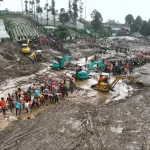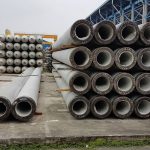Welcome to Liga Asuransi, a portal that discusses risk management, business protection, and the importance of having insurance protection.
Typhoon Ragasa (Super Typhoon Ragasa) struck Hong Kong with extraordinary force, paralyzing almost all city activity. Heavy rains accompanied by strong winds caused severe flooding in residential areas and the central business district. Thousands of properties were damaged, public transportation came to a complete standstill, and economic activity came to a standstill. This situation resulted in significant losses for residents and businesses, estimated at trillions of rupiah.
Events like Typhoon Ragasa are a reminder of how important it is all risks property insurance as the main shield against the threat of natural disasters that can come at any time.
Latest Facts Typhoon Ragasa in Hong Kong
Typhoon Ragasa (Super Typhoon Ragasa) A typhoon that struck East Asia was declared one of the strongest storms of 2025. Hong Kong was the hardest-hit region, suffering enormous losses. Strong winds and torrential rain paralyzed the city’s activities within hours.
Transportation was the first sector to collapse. More than 400 flights were canceled at Hong Kong International Airport, leaving thousands of passengers stranded without a confirmed departure date. Subway and city bus services were also temporarily suspended for safety reasons.
In the city center, knee-deep to waist-deep floodwaters inundated restaurants, hotels, and shopping malls. Many retail businesses were forced to close, while small and medium-sized business owners reported significant losses due to damaged inventory. Several residential areas were also inundated, forcing the evacuation of hundreds of families.
Infrastructure damage worsened, with hundreds of fallen trees blocking major roads. Buildings and property sustained significant damage, from shattered windows to blown-off roofs. According to a Reuters report, local authorities stated that Typhoon Ragasa caused temporary economic losses of more than US$1 billion (approximately Rp15 trillion), and this figure is expected to rise as field assessments continue.
As reported by Gulf News, the Hong Kong Meteorological Administration has classified Ragasa as a super typhoon, with winds reaching 215 km/h. This makes it one of the deadliest typhoons in the past decade.
This disaster once again emphasized how fragile even large cities are when faced with the wrath of nature.
Impact of Hurricanes on Business & Property
Typhoon Ragasa not only devastated the lives of Hong Kong residents, but also dealt a severe blow to the business and property sectors. Within hours, thousands of small businesses and large corporations suffered significant losses.
1. Retail and Hospitality Sectors Are Declining
Shopping malls, boutiques, restaurants, and even hotels were affected by the flooding that hit the downtown area. Merchandise, from clothing and food to electronics, was damaged by the floodwaters. Many restaurants reported having to throw away freshly delivered ingredients, while luxury hotels in the Tsim Sha Tsui area were forced to cancel reservations due to power outages and flooded facilities.
The losses suffered by the hospitality sector extend beyond property damage to potential revenue due to mass cancellations of reservations. For retail businesses, especially MSMEs, the loss of inventory can mean bankruptcy.
2. Transportation & Logistics Paralyzed
With more than 400 flights canceled and land transportation halted, the distribution of goods has been severely disrupted. Many containers remain stuck at ports, while logistics fleets are immobilized by fallen trees. For distributors of food, beverages, and daily necessities, this situation is a nightmare. Products are not reaching customers, stock is rotting, and relationships with business partners are at risk.
3. Residential & Commercial Properties Severely Damaged
The storm’s immediate impact was visible on property. Thousands of homes suffered damage ranging from blown-off roofs, broken windows, and partial collapse. Office buildings and businesses were also damaged. Preliminary reports indicate damage to commercial properties is in the hundreds of millions of dollars.
For property owners, this damage isn’t just about repair costs. There are indirect losses, such as lost rental income, interrupted business contracts, and even a damaged reputation due to operational disruptions.
4. Domino Effect on the Economy
The damage caused by Typhoon Ragasa went beyond physical damage. Hong Kong, known as one of Asia’s financial centers, was completely disrupted. Investors were wary, global companies postponed transactions, and the tourism sector experienced massive cancellations.
According to local analysts, the economic impact of this storm could be felt for months to come. Without proper mitigation, particularly through insurance coverage, many businesses risk losing their competitiveness and being unable to recover.
5. The Importance of Insurance Protection
The Ragasa tragedy opened many people’s eyes: no business or property is completely safe from natural disasters. In conditions like these, insurance is no longer just an option, but a primary necessity. Protection like all risks property insuranceable to cover physical damage to buildings, loss of stock, and losses due to operational disruptions.
Relevant Insurance for Natural Disasters
The tragedy caused by Typhoon Ragasa in Hong Kong serves as a stark reminder: natural disasters can strike at any time, devastating businesses and assets built over years. In this context, having the right insurance coverage is not just a formality, but a vital survival strategy. Here are some types of insurance that are highly relevant for dealing with the risks of storms, floods, and property damage.
1. Property All Risks Insurance (PAR)
This type of insurance provides comprehensive protection against physical damage to buildings, equipment, and inventory caused by various risks, including storms, floods, and fire. Unlike standard fire insurance, which has limited coverage, all risks property insurance much more comprehensive.
- Protect office buildings, warehouses, and retail stores from physical damage.
- Covers losses for merchandise damaged by flooding.
- Providing peace of mind for business owners so they don’t have to bear the cost of major repairs alone.
2. Business Interruption Insurance
Business losses don’t always come from direct damage, but also from the interruption of operations. For example, a restaurant may be forced to close for weeks due to flooding, or a hotel may lose guests due to damaged facilities. Business interruption insurance will cover losses in the following ways:
- Loss of income during periods when the business is unable to operate.
- Fixed costs that must still be paid even if operations stop.
- Maintain cash flow so that the business can recover more quickly.
3. Marine Cargo Insurance / Freight Insurance
In the Ragasa case, logistics distribution was paralyzed due to disruptions to air and sea transportation. Marine cargo insurance protects goods during transit, whether by land, sea, or air. If goods are damaged, lost, or detained due to a storm, business owners can receive compensation according to the insured value.
4. Engineering & Infrastructure Insurance
For construction companies, port operators, and building managers, engineering insurance is crucial. This policy covers the risk of infrastructure damage caused by storms, crane collapses, and heavy equipment failure. This protection ensures projects avoid significant losses and continue to operate after a disaster.
5. Commercial Vehicle Insurance
Distribution and logistics businesses that rely on fleets of trucks or operational vehicles also require special protection. Commercial vehicle insurance protects against damage caused by floods, fallen trees, or accidents during extreme weather conditions.
Case Studies & Lessons from Hong Kong
Typhoon Ragasa provided a stark illustration of how vulnerable a modern city is to natural disasters. Even Hong Kong, known as Asia’s financial hub with sophisticated infrastructure and advanced early warning systems, was unable to completely escape the impact of this devastating storm.
Case 1: Five-Star Hotel Flooded
An international hotel in the Tsim Sha Tsui area was forced to close operations for more than two weeks. Key facilities, including the lobby, restaurant, and conference rooms, were severely damaged by the flooding. Thousands of reservations were canceled, and losses were estimated at millions of US dollars.
Lesson: Without all risks property insurance And business interruption, repair costs and lost revenue will be a heavy burden that could shake the company’s financial stability.
Case 2: Food Distributor Warehouse Damaged
A major food distributor in Kowloon reported that thousands of cartons of processed meat products, bottled drinks, and other raw materials were completely destroyed by a power outage that caused refrigeration to stop working. The products spoiled within hours.
Lesson: This situation highlights the need for stock insurance and marine cargo, especially for companies that rely on sensitive supply chains such as food and beverages.
Case 3: Fashion SMEs Lose Stock
Several small boutiques in the Causeway Bay district reported that their newly displayed autumn collections were destroyed by the floodwaters. For small and medium-sized enterprises (SMEs) with limited capital, the loss of inventory could mean permanent bankruptcy.
Lesson: Even MSMEs need protection, not just large corporations. Insurance for inventory and property protection is crucial for business continuity.
What Can Indonesia Learn?
Indonesia is no stranger to natural disasters. Floods, storms, and landslides hit various regions every year. However, infrastructure preparedness and public awareness of the importance of insurance are far lower than in Hong Kong.
Business actors in Indonesia, both small and large scale, need to learn from the Ragasa case:
- Don’t delay protection. Disaster comes without warning.
- Calculate the risk wisely. The cost of insurance premiums is much smaller than the losses caused by storms.
- Engage an experienced broker. Like L&G Insurance Broker who can help choose the best policy, adapt it to your business character, and ensure claims run smoothly.
Typhoon Ragasa has left deep scars in Hong Kong. However, for Indonesia, this tragedy can serve as a momentum to raise awareness of the importance of insurance protection for business and property sustainability.
The Role of L&G Insurance Broker
Choosing the right insurance is no easy task. Insurance policies have detailed terms, exclusions, and additional clauses that can be confusing. This is where…L&G Insurance BrokerWe are here as a trusted partner. With extensive experience in the insurance industry, L&G helps companies:
- Analyze business-specific risks.
- Choose insurance products with the most relevant benefits.
- Monitor the claims process so that it is disbursed quickly and without hassle.
Disasters such asTyphoon RagasaThis demonstrates the importance of risk mitigation. With the support of an experienced insurance broker, your business and property can be well-protected, even in the midst of the biggest storms.
Cover
Typhoon Ragasa (Super Typhoon Ragasa) The devastating storm that devastated Hong Kong was not just international news, but a stark warning for all businesspeople and property owners in Asia, including Indonesia. The devastating storm demonstrated how natural disasters can instantly devastate lives, wipe out assets, halt businesses, and cause trillions of rupiah in losses.
The question is, are we prepared for a similar situation? The facts show that without adequate protection, businesses and properties will struggle to survive. This is where the role of all risks property insurance has become vital. This policy provides comprehensive protection against physical damage to buildings, warehouse contents, and high-value inventory. This is complemented by other insurance coverage such as business interruption and marine cargo, risks that initially seemed devastating can be managed more safely.
However, choosing the right insurance product is not easy. Every business has its own risk differently, everypolicyThere are detailed clauses that must be carefully considered. Therefore, you need a partner who is trustworthy, experienced, and understands your business needs.
L&G Insurance Broker We’re here to provide solutions. We not only help you choose the best policy but also guide you through the claims process. With professional service and an extensive network, we ensure optimal protection for your business and property.
Consult your business and property protection needs now for FREE via WhatsApp 08118507773 or email halo@lngrisk.co.id.














